|
From the June 11, 2018 issue of the Christian Science Sentinel Is it possible to love God in a time when, in many Western countries, there is a growing number of both those who don’t believe in the existence of God and those who consider themselves spiritual, rather than religious? Maybe before tackling the question of how to love God in such an environment of doubt and denial, one needs to start with the basic question “Does God even exist?” It’s a question I’ve asked myself. Although I was raised in Christian Science, after some years of wrestling to understand God and make Christian Science my own, I left churchgoing, seeing only what I felt were questionable personal interactions and a narrow denominational focus. But after time spent finishing my schooling and traveling the globe a bit, I noticed something rather basic, and quite profound to me—that everything revolves around love. Whether it was seeing the love expressed by children playing in different parts of the world, or experiencing the love of learning in college, I realized that the idea of love as a harmonizing, beautifying, and creative force was everywhere. This struck a chord with me. I may have questioned if God exists, but I had no doubt about love’s existence. I remembered learning in Christian Science that Love is a synonym for God. I started looking at Christian Science anew, not as a cultural or denominational phenomenon as I had before, but as a Science that explains spiritual laws of being drawn from the Bible’s statement “God is love” (I John 4:8). The Christian Science textbook, Science and Health with Key to the Scriptures by Mary Baker Eddy, says, “The Christian Science God is universal, eternal, divine Love, which changeth not and causeth no evil, disease, nor death” (p. 140). This can seem incomprehensible to the human mind, which is slow to discern anything that goes beyond the material sense of things. But to understand the unlimited nature of Love is to have some sense of the infinite God, or Truth, that bases reality. And as I took up the study of Christian Science once again, I saw how freeing it was to love God—even in a world that seemed to be consumed with material things and personalities. I could become more acquainted with infinity than with limitations, and more acquainted with Love than with the fear of lacking love. I could go down deep to understand our fundamentally spiritual being and our inseparable relation to pure, spiritual, divine Love. This is brought out in “the scientific statement of being” in Science and Health, which asserts, “All is infinite Mind and its infinite manifestation ….” The boldness of the assertion of God’s allness follows the equally bold dismissal of materiality: “There is no life, truth, intelligence, nor substance in matter.” These then lead to the profound conclusion, “Therefore man is not material; he is spiritual” (p. 468). Christian Science explains that God, Love, is the only reality, the only actual substance and cause. Divine Love operates through spiritual laws that break through material beliefs formed by fear, such as dogma, hate, divisiveness, and sickness. Love restores harmony. It grounds us on the rock of Truth, where the storms and stresses of the human experience are dispelled—not isolating us from the human experience, but deepening and enriching it. How does this work? An analogy may help. Years ago, a friend and I took a photography class that included a section on the study of light. When I drove home that night, I started to see billboards, headlights, trees—everything—in a new way. Nothing had changed physically, but I saw how the light bathed everything, giving it texture, form, and highlights—even the darkness was defined by light. It is like that with new and clearer insights into the nature of infinite Love. When I realized that Love was the substance of all, my thought shifted, and I saw everything in my experience transformed in this new light of Love, in which Love defined everything. And as I took up the study of Christian Science once again, I saw how freeing it was to love God—even in a world that seemed to be consumed with material things and personalities. Loving God is knowing God as Love, and that understanding brings changes in the heart as well as healing. Prayer that affirms the infinite breadth of Love brings out that surge of possibility, that purity of desire to understand that Love is impossible to stop, avoid, or prevent. As light dissolves darkness, Love dissolves the mental darkness that makes materiality feel so real, and reveals our wholeness, resulting in healing and transformation. In proportion as I was gaining in the understanding that divine Love is omnipresent and omnipotent, materialism with all its temptations and fears lost its influence. It was in those gains that I experienced healings—some of physical ailments, some of fears and other discords. And I experienced changes in character, reversing bad habits and becoming more honest and compassionate. This quote from the Gospel of John took on new meaning for me: “For God so loved the world, that he gave his only begotten Son, that whosoever believeth in him should not perish, but have everlasting life. For God sent not his Son into the world to condemn the world; but that the world through him might be saved” (3:16, 17). God, as divine Love, doesn’t lead us to perish, but to thrive. Love does not condemn, but corrects and governs. Through God’s love we are saved, and feel the power of Love to heal us and to redeem us from under a material sense of life that is full of sickness, limitation, division, and sin. Our lives flourish as we understand that materialism cannot define us or confine us and that Love is supreme. The Bible says, “Hear, O Israel: The Lord our God is one Lord: and thou shalt love the Lord thy God with all thine heart, and with all thy soul, and with all thy might” (Deuteronomy 6:4, 5). And in accepting this all-out, wholehearted commitment to loving God, we see the light of Love everywhere. ......
0 Comments
 From the January 9, 2017 issue of the Christian Science Sentinel “Oh, be joyful!” That was the first thing the Christian Science practitioner said when I called her as a young girl, asking for prayerful help in healing a painful condition. And the healing came quickly, as did the surprising realization that God loves me with consistency and joy. As I grew into adulthood, there were numerous times when I got to see how joy, brought on by understanding there can never be a separation from God, broke through the mesmerism of doubt, anxiety, and fear, and replaced it with a calm and confident assurance of God’s consistent love—and how this brought healing. To kearn more about joy, click here! 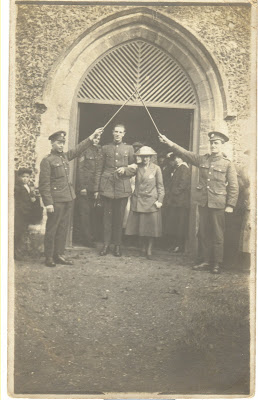 A picture of my grandmother and the grandfather who introduced Christian Science into our family A picture of my grandmother and the grandfather who introduced Christian Science into our family From the May 14, 2012 issue of the Christian Science Sentinel Testimonies of healing are everywhere! And they are central to Christian Science. They are in The Christian Science Journal, Sentinel, and Herald magazines, at testimony meetings, in Sunday School lessons, in the last chapter of Science and Health, and online. The power of the testimony lies in the fact that Christian Scientists can prove what they’ve learned by healing. And no one can take away or discredit what we have proved for ourselves. My family was introduced to Christian Science when my grandfather was healed of severe head injuries. His testimony and other healings my family had (see below) were the springboard for me to practice Christian Science. Although I broke away from it for about a year at one point, wanting to discover Truth for and by myself, I ultimately came back because I found Christian Science so compelling. I was seeing that the ideas of Christian Science, the law of Love, were everywhere. It seemed that all aspects of my life were showing me more of the relevance of Christian Science. After making it my own, I saw how its ideas helped my post-college work in education. Later I worked as an administrator for a Christian Science nursing facility, where I saw countless examples of how practical Christian Science is. Being married and having children showed me how tender and powerful Love is. Later, in a job with the publisher of Mary Baker Eddy’s writings, I supported the worldwide distribution of Science and Health. As I traveled to Europe, Asia, and Latin America, I saw how deep the hunger and wide the demand is to know more about Christian Science. Looking back, I see that each step was preparing me to be a healer. And I just wanted to take more steps! I wanted to dive in with a commitment to help make this Science available, responding more fully to the growing demand for healing through prayer. I knew it was my time to add to the record of healing by becoming a Christian Science practitioner. I got an office, set up a website, put an ad in the local paper, and I was off!....... To read more,
More about healing:
Healing through prayer in Christian Science has been a standard thoughhout my life. My family and extended family could list many healings of business challenges resolved, third and second degree burns healed, healings (broken bones, coma, etc) resulting from car accidents, migraines, slipped disk, wrenched knees, lost items found, relationship issues resolved, homes found, moving family across the country, financial problems reversed and many more - all resolved and healed through Christian Science prayer. Click on here to here of more testimonies of healing that came about through prayer in Christian Science. From the May 1996 issue of The Christian Science Journal It is natural to expect healing in Christian Science to come quickly. There may be times, though, when it isn't immediate, and we need to be firm in keeping out harmful thoughts that would impose themselves on us. Are we tempted, for instance, to condemn ourselves simply for finding ourselves in a challenging situation? Such a thought isn't from God. It's a suggestion of the carnal mind, which would focus our attention on a false view of man as a sinful or victimized mortal. It needs to be recognized as false and replaced with the sweet, perfect, and authoritative truth that God is pure good and that man is His immortal, unblemished, uncontaminated child, inseparable from divine Love. We have nothing to be ashamed of as we work to establish a clearer understanding of the activity of God and His Christ in our lives. And we can remember that our caring Father-Mother, God, gives us all that we need. The Bible says, "My God shall supply all your need according to his riches in glory by Christ Jesus." 1 God is all-powerful, all-gracious, and man is the direct expression of God. The relationship of God to man is as close as the relationship of a parent to a child—in fact, closer. God and man are inseparable, like the sun and the sunlight. You simply cannot have one without the other. So it follows that man is because God is. Because of our unity with God, we can expect to understand and feel God's regenerative, purifying love. This understanding disables any sense of guilt or condemnation, or the fear of malicious criticism, and restores the perception of our heaven-bestowed status of health and harmony. ......... to continue reading..........
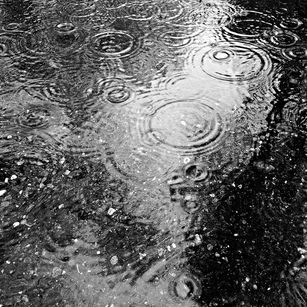 From the Sept 2, 1996 issue of the Christian Science Sentinel It's all right to cry. Let the tears take you down to a place you thought no one ever knew about, behold the Christ is here. You are not alone. Behold the Christ is here, the spirit of God, giving a cup of cold water, pouring you out a blessing, filling up the vacant hope, spilling over with an endless, purifying love and assurance: "I have overcome the world."* The Christ is here, carrying you with the truth that your life is flooded with God's infinite goodness. Be comforted now with clearer, wider vision. You are not alone. *See John 16:31-33. 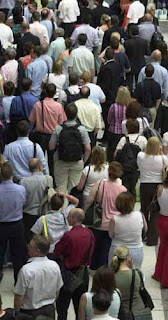 From JSH online June 08, 2012 - Practice, Practice, Practice I just finished another call from a patient, and I am in awe. It is evident that God is leading both of us to a greater understanding of our relationship to Her—and this understanding is conquering every sort of sin, every sort of chaos, discomfort, and disease. My practice is like being involved in an army of good. I see that each patient self-enlists when she or he calls. There’s some challenge that needs addressing. It’s the patient’s spiritual sense, their own “conscious, constant capacity to understand God” (Science and Health, p. 209) that leads them to seek healing of the issue. Although the challenge may seem to be something that is intimately theirs, it’s really only an iteration of the belief that God is not all powerful. The problem may exist at a micro-level and seem to be personal, but it also exists at a macro-level and is a world belief—the belief that any of God’s children can be separated from Him. When we pray together, we open ourselves up to Truth, God. And that opening reveals our inseparable relationship to God, to Truth and to Love. My patients have faced down fear with Love; disease with whole and vibrant health; sensuality with purity; apathy with renewed purpose and vigor. I track all progress and healing, and it’s awesome to review each month’s work and reaffirm the progress of Love that has healed all kinds of conditions in all sorts of ways. _____________ _ _ _ _ _ to continue reading:
I was moved to hear of Supreme Court Justice Ginsburg's tribute for her friend and colleague Supreme Court Justice Scalia. Part of that tribute included this line " 'We are different, we are one,' different in our interpretation of written texts, one in our reverence for the Constitution and the institution we serve." Their lives together as friends is a model that shows how we can all work together, even with vastly different views. And to go one step further, we can see that those who oppose us are sometimes those that force us to refine and strengthen what we believe.
Mary Baker Eddy, reformer and founder of Christian Science, writes '“Love thine enemies” is identical with “Thou hast no enemies.” Wherein is this conclusion relative to those who have hated thee without a cause? Simply, in that those unfortunate individuals are virtually thy best friends. Primarily and ultimately, they are doing thee good far beyond the present sense which thou canst entertain of good.' (from Miscellaneous Writings, p. 9:9) Harmony does not always mean homogeneity. Harmony means that there is a congruity in which we can value and love others on the highest level - a spiritual basis. As you read this article about Scalia and Ginsburg, Ginsburg's tribute is full of appreciation for Scalia's intellect and wit, and devotion and allegiance to his work. Their disagreements served to refine her arguments, further benefiting her office and interpretations of law. Their friendship went higher than their disagreements, as they " bonded over their love for their country and their passion for the law." (To read the full article on Scalia and Ginsburg, click here.) This made me think of how I have dealt with disagreements within family, work groups or politics. Have I been able to see beyond the immediate clash, to value those with differing opinions and to see how those different views can challenge and change or strengthen my own understanding? Can I see that we are all united by our love for the same thing? We stand on a lot of territory that is common ground. Am I claiming that common ground enough so that we can all work together in ways that are progressively better? Mary Baker Eddy writes about the impact of oneness. But before I share that, consider the word "God". Let's take from that word any sense of dogma, division and denomination. Let's use that word as synonymous with Love, as it is done in the book of John when he writes "God is Love." This opens the door on what is possible when we focus on our higher selves, the "better angels of our nature" as Lincoln coined that phrase. Where it says "One infinite God, good, unifies men and nations" let's consider "One infinite Love unifies men and nations" and then read on "... constitutes the brotherhood of man; ends wars; fulfills the Scripture, “Love thy neighbor as thyself;” annihilates pagan and Christian idolatry, — whatever is wrong in social, civil, criminal, political, and religious codes; equalizes the sexes; annuls the curse on man, and leaves nothing that can sin, suffer, be punished or destroyed." (See Science and Health p. 340:23-29) We can go so much farther by working together. The Ginsburg/Scalia friendship certainly gives us hope for what we can all achieve with one another. As we are in full swing with the election season, this is the higher road and hope we can all claim.  You may already know that the Psalms written in the Bible were actually songs. They cover most of life's issues in the 150 songs written. I learned lots about Psalms today at a meeting with our hospital's very cool prayer team. According to the book Out of the Depths: The Psalms Speak for us Today, there are six major themes for the psalms: 5 storytelling psalms (example: Psalm 78); a whopping 64 lament psalms - the most popular type of all songs (example: Psalm 22); 20 Thanksgiving psalms (example: Psalm 116); 17 psalms of praise (example: Psalm 147); 36 Festival psalms (example: Psalm 47); and 22 meditation or wisdom psalms (example: Psalm 23). What impressed me most is to learn of the context and reasons behind these songs. The Psalms were written as a life story. This led us to ask- how would each of us capture our life story in its different aspects of praise, wisdom, lament, etc? How would we use a psalm as a vehicle to sing our own song? As an example, we looked at the most popular psalm: the 23rd Psalm: A Psalm of David The Lord is my shepherd; I shall not want. He maketh me to lie down in green pastures: he leadeth me beside the still waters. He restoreth my soul: he leadeth me in the paths of righteousness for his name's sake. Yea, though I walk through the valley of the shadow of death, I will fear no evil: for thou art with me; thy rod and thy staff they comfort me. Thou preparest a table before me in the presence of mine enemies: thou anointest my head with oil; my cup runneth over. Surely goodness and mercy shall follow me all the days of my life: and I will dwell in the house of the Lord for ever. And then we looked at this same psalm rewritten from the Eskimo perspective (author unknown). A Psalm of the Eskimo The Lord is my master: I am his dog. He makes me lie down in soft snow; He leads me across the firm ice: He calls to me encouragingly. He drives me on good trails because I belong to Him. Through storms and troubles, I will not be afraid because He is with me, My harness is securely fastened and His hand is on the sled. He guards me while I eat, though enemies lurk near. He doctors my hurts. My heart overflows with gratitude. Only kindness and gentle care will be mine from the hands of this Master And I will be on His team forever. So, dear reader, how would you write your own psalm? Is it possible that just by knowing God – this can heal you?
A little boy prayed for his younger sibling and simply by understanding God – and this without a whole lot of words, study and instruction – his little brother was healed of a inflamed ear and earache. The little boy knew God. He knew that God made his younger brother to be well, to play and be happy. He knew that God is totally good. He operated on a Principle of Love, sung by the Psalmist, established by Christ Jesus, discovered by Mary Baker Eddy and demonstrated countless times in the many healings in Christian Science that we are reading about today. I will praise thee; for I am fearfully and wonderfully made: marvellous are thy works; and that my soul knoweth right well. Psalms 139:14 So let's break this down: What does it mean to know God? Mary Baker Eddy, discoverer and founder of Christian Science, defines God as omnipotent, omnipresent, omniscient. These are huge concepts for the human mind to comprehend. Having all power means there is no room for any other power. Being omnipresent means there was never a time in the past, never a time now or in the future where any other power could have influence. Being omniscient means that there was never a time when God's power was ever faulty, missed the mark, forgot details, etc. From the infinitesimal to infinity, God's understanding intelligence is the only influence, the only guidance, the only Love. God's love shows forth an exacting care to all of Love's ideas, powerfully, constantly, and precisely. To know God is to trust God. The Psalmist sings this out in Psalm 3: 5 “Trust in the Lord with all thine heart, and lean not unto thine own understanding. In all thy ways acknowledge Him and He shall direct thy paths.” What is the result of this trust? Again, from the above psalm: Ps 139:14 “I will praise thee; for I am fearfully and wonderfully made: marvellous are thy works; and that my soul knoweth right well.” Praise and joy come from this trust, which is then made manifest in our lives as well as on the body. To know God is to know no other power God is whole, complete, pure Truth. God is life – eternal, harmonious. God's perfect love brings out Her exacting care. There is only one Mind, one God. To know God aligns our thought and lives with what is real. But it also does another thing. Knowing God removes anything unGodlike. Similar to the nature of light: the light doesn't know the darkness; light isn't influenced by any of the characteristics of darkness – it does not need to know why the darkness seems to be there, how long it seems to have been there, etc. The light just does what it does – it shines, radiates forth, and the darkness dissolves. Having no other gods Disease is a mental concept supported by beliefs originating from fear of isolation, separation or divisiveness; a belief and fear of intelligent matter; a fear of evil as a power, and /or a belief in chance and deterioration of good. We don't need to bow down to these ideas. They have no substance. In fact, these beliefs need one's consent to actually take hold in thought, as they have no originating power themselves. They are commonly referred to as error – appropriately named as these beliefs are simply mistakes, lies about what is true. Mary Baker Eddy told a student "Error comes to you for life, and you give it all the life it has." (Twelve Years with Mary Baker Eddy,Amplified Edition, p. 98). We have divine authority to refuse to give error any life. We can refuse to animate and act out the fears and suggestions that say we are separate from God, or isolated from Love. Popular belief may guide diseases' developments from health to illness and vice versa but it won't be eradicated until all false premises are removed. Diseases will seem to pop up in sporadic and random ways until the context of disease is shattered. And how are these false premises removed and its context shattered? By knowing God. No room for disease By knowing God as whole complete, pure; and knowing Truth as omnipotent, there is no room for chance in establishing health or for the fear of the randomness of intelligent matter. God is life – eternal, harmonious. This crowds out all thought that suggests that limitation or deterioration could be part of our lives. God's perfect love brings out Her exacting care. This removes the argument that we could ever be separate or isolated from God's goodness, abundance and guidance. There is only one Mind, one God. This replaces the false premise the evil has a separate mind and is powerful. There is a sweet saying flying around the internet that says “Don't tell God you have a big problem; tell your problem you have a big God.” Great is our Lord, and abundant in power; his understanding is beyond measure. Psalm 147:5 There is great comfort in knowing that we need never despair. The more we understand the omnipotence of Truth, the ever-presence of Love and the all-knowing nature of divine Life, the more we will feel that confidence and assurance that we are safe and that “with God, all things are possible.” 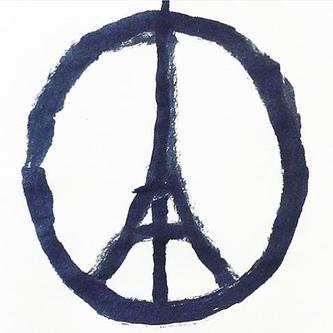 I am listening to news reports on Paris as I write. Prayer, support, continues to flood in on my news feed. The whole world is responding. I am drawn to pray for those wounded. Years ago, I was waiting for the bus that would take me home. Two elderly man got up from the bus bench and started walking toward the bus and then tripped and fell under the bus as it pulled away. People immediately surrounded them and I bent down to talk to one of the men as others called for an ambulance. I don't remember what I said but the word “Christ” came distinctly in thought. Christ – it's a word that means to me comfort, tenderness, attentiveness, power and peace. I felt that and I think he did too. Soon, the ambulance came and swept them off to the hospital. It brings it home that the Christ is right there, comforting those involved. The Christ is here. Comfort, support, help and strength are being called for now. Love endures. “The world needs the poise, breadth, confidence, and vision of our prayers. It needs our seasoned experience in overcoming apparent evil by realizing God’s presence. It needs our grace to move forward with compassion and our insistence that greater good can come from any disturbance—no matter how large or small.” I was searching the internet for ideas and prayers and have posted them here. Please add your own prayers here:
In any group consciousness, the stronger thought rules the weaker. And we can refuse to let hatred, anger, mental illness be the stronger thought.
Onward and upward! Kim Headlines about yet another shooting has brought out the idea that prayer is not enough to stop this violence. But are we making the right demands on prayer? Are we almost using prayer as a way to plead without realizing the resources we already have. That would be like a millionaire begging for money. Are we begging for peace, while not being aware of the dominion we have been given to establish peace?
One commandment tells us that we are not to take the name of the Lord in vain. (See Exodus 20: 7.) Could that mean we are not to pray and not expect results? Christ Jesus' prayers had results. They healed. They had a way of cutting through the thought of crowds of hatred, of slicing through sexism, ageism, racism, and ignorance and maliciousness – and establishing harmony, health, social order and peace to those receptive to it. What was it that he knew and taught that can be relevant today and on campuses everywhere? What can we learn from Christ Jesus as a healer, reformer and peacemaker? A knowledge of the overwhelming power of Truth and Love. Love takes no backseat to terror and violence. Prayer based on God's love is not an opiate or coping mechanism. Christ Jesus' knowledge of God as Love emboldened and secured his path. He knew the power of God was made manifest as Love and Truth and this radically changed the course of humanity. How does this help us? We can stand on the proof that good is not helpless, and that throwing our weight on the side of Truth and justice opens the door for justice and truth to operate. In any group consciousness, the stronger thought rules the weaker. And we can refuse to let hatred, anger, or fear of mental illness be the stronger thought. There is overwhelming evidence that life continues, and that goodness is our common ground. Life, without love is unsustainable. Progress, moving us to greater responsibility to humanity, marches on. The Christian Science Monitor had an article by John Yemma “Why Progress Endures” which included this gem: “One of the best arguments for progress being more than wishful thinking is contained in “The Lessons of History,” a slim volume that Will and Ariel Durant wrote after spending half a century researching and writing their magisterial series, “The Story of Civilization...." Earlier in their book, the Durants acknowledged that the history in which they had immersed themselves rarely recorded quiet progress: “Behind the red façade of war and politics, misfortune and poverty, adultery and divorce, murder and suicide, were millions of orderly homes, devoted marriages, men and women kindly and affectionate, troubled and happy with children.” Life is persistent. A consciousness of the sustaining power of Love is strong and enduring, standing up to the violence of the day. Love always has won, always wins, always will win. Righteous anger Prayer is not a vacuous hope that things will be better. Prayer is power. In 2 Corinthians 10: 4, we agree that "The weapons we fight with are not the weapons of the world. On the contrary, they have divine power to demolish strongholds." (NIV) Prayer is a communion with omnipresent power known as God, who is defined by early Christians as Love. (See 1 John 4:16.) This Love is not variable but consistent and pure. Prayer forms the basis of thought out of which come our actions. Prayer based on pure Love, fuels moral courage. Anger based on fear is destructive, but righteous anger that stands up against hatred, fear, and violence -- and based on everyone's God-given rights to live and love -- is transforming. Christ's stark protests against hypocrisy, prejudice, violence and greed broke the hold these had in thought and opened the doors to a higher sense of peace and justice. These protests are just as needed today. Act Jesus' works confirmed his words. And in fact, without his works, his words were empty. That is still the case today. We all need to walk our talk - prove our prayer. The importance of prayer is that it lays the foundation for our action. A knowledge of the power of Truth, God comes with it a seasoned and reasoned sense of the fallible nature of evil and the infallible nature of good. It calms the thought and we are able to listen – we are able to be still – quieting the restless thoughts and anguish that sometimes surround violent events – and act out of an intelligent and comprehensive Love, not out of hatred, doubt, apathy or fear. Prayer can lead us down productive paths, and can give us the moral courage to help us take whatever human footsteps are necessary. Whether this means simply a prayer that weighs in with the wave of healing and progressive thoughts of others, or a series of human footsteps motivated by a greater good for all -- we have the tools at hand to claim everyone's right to safety and security. We can appeal to humanity's higher nature that is earnestly and urgently desiring to protect our children and the safety or our educational institutions and our homes. We can act to remove senseless violence.  Headlines have grabbed our hearts with stories of Europe's growing immigrant crisis - and people are responding. The Pope's recent call for Catholic churches to open up their churches to express Christian mercy in housing a refugee family is one such response. (See http://on.wsj.com/1JZM6pt.) To pray for others -- with prayer that is selfless, unbiased, unambitious, impartial, and universal -- sets a lasting foundation for actions based on that prayer. My husband and I have shared our homes and our lives to over 20 individuals in our almost 30 years of marriage and it has enriched our lives immeasurably. Was this hard? Did we have to give up a lot in order to make room for others? We did make changes in our lives to do this, but our home became a multi-layered blessing because of it. My favorite story is about a family of refugees whom we befriended. My older son brought home a new boy from middle school, and we soon became friends with his family. Their story of how they came to the US was dramatic. Exiled from their war torn country after the husband was kidnapped, the family was forced to leave with only the clothes on their backs. There were immigration issues and then resettling and acclimating to a whole new culture that had already taken place by the time we met them. The mother did an amazing job of caring for her four children in the two bedroom apartment they were given. And when we met, we realized we had a wonderful opportunity for sharing support and love with this family. What helped me become a better help to that dear family was all based on prayer. These three ideas were foremost: 1 - that we are all children of God (Romans 8:16) This gave us an immediate connection one another. There was no sense of burden or heavy obligation, only a sense of newness and adventure. There was no fear, anxiety or sense of strangeness as we all embraced a new opportunity for friendship. 2 - home is the center, though not the boundary of the affections (Science and Health 58:21) The mother made a wonderful home for her children while they waited for word about the husband. They kept their heat up high as it reminded them of home, and were able to find familiar foods that brought them all comfort. We learned how to make some of their meals and my husband enjoyed some of the richest coffee from freshly roasted beans. As they had never seen snow, we helped them get warm outdoor clothing for a cold Minnesota winter. We went to the local YMCA so the kids had some fun activities they could feel a part of. My mother taught both the girls how to swim. We shared our prayer and they attended church and Sunday School with us a couple of times. By going beyond our familiar boundaries of home, we were all blessed. 3- God setteth the solitary in families (Ps 68:6) Months into our friendship, we got work that would mean a move to the East Coast. As I continued to pray, affirming that God's grace and comfort were continuous, I gained a confidence that God would indeed supply all good and continue to do so for both of our families. No one can be outside of God's care - no one is isolated. I knew the husband could never be outside of God's care. My prayer included a desire to see our friends' predicament in a new light. I could trust God to take care of His family. In fact, a week before we were to leave, we heard that the husband had been found and was returning to the family. The day we were to leave was the day he was reunited with his family. Whenever we have the opportunity to give, we are also getting the opportunity to grow in grace, in wisdom and experience. Mary Baker Eddy writes in Science and Health with Key to the Scriptures, p. 79: "Giving does not impoverish us in the service of our Maker, neither does withholding enrich us." We certainly found this to be true. Giving shelter - and all the comfort, joy and companionship that is included - certainly gave us a stronger, more loving sense of home that embraced a much wider circle than we ever imagined possible.  Today I got an interesting email from an intern asking about science and religion. My response led me to some interesting ideas that I'll share here: Hello, I am an intern with RMN and as part of our duties we have this YouTube channel known as the GPA that deal with compelling visions of the future from the perspectives of scientists and innovators. I found your blog and I liked what you had to say in regards to the topic of christian science and am interested in hearing what you have to say in how science relates to religion in this modern world. There are plenty of different topics such as Artificial Intelligence, or the mathematics behind preserving your brain and transhumanism. Check out our playlists Thanks and enjoy! DHB  Hello! Delightful to hear from you and thanks for your message. I watched a couple of youtube selections and found them very interesting. I've been asked about science and religion a lot, and have some favorite ideas. You may have heard of John Polkinghorne, the former physicist who turned to the priesthood. This is an excerpt from an interview with him written up in God vs. Science | The Saturday Evening Post's article: " How an acclaimed physicist is struggling to reconcile one of the great philosophical arguments of the modern age." Science and religion are not mutually exclusive, Polkinghorne argues. In fact, both are necessary to our understanding of the world. “Science asks how things happen. But there are questions of meaning and value and purpose which science does not address. Religion asks why. And it is my belief that we can and should ask both questions about the same event.” As a for-instance, Polkinghorne points to the homey phenomenon of a tea kettle boiling merrily on the stove. “Science tells us that burning gas heats the water and makes the kettle boil,” he says. But science doesn’t explain the “why” question. “The kettle is boiling because I want to make a cup of tea; would you like some? “I don’t have to choose between the answers to those questions,” declares Polkinghorne. “In fact, in order to understand the mysterious event of the boiling kettle, I need both those kinds of answers to tell me what’s going on. So I need the insights of science and the insights of religion if I’m to understand the rich and many-layered world in which we live.” In Christian Science (CS), we take a deep look at the teachings of Christ, not from a dogmatic or orthodox stance, but to practice what Christ Jesus taught and to see how forgiveness and compassion can heal our relationships with one another, and how an understanding of God as Love can cure disease. Just as Christian Scientists have to correct mistaken notions by sharing Scientology has nothing to do with Christian Science; we also need to share that we are united with Christians on many fronts, but not all. For instance, evil is not ignored, but it is challenged; it is not considered a power source, nor is it dignified by giving it our power. All individuals - regardless of race, religion, orientation, gender - are understood as being made in the image and likeness of God. God is seen as Love, and this is not variable, and so it follows that God does not send sickness, suffering or death; but understanding God, as Christ Jesus taught, has shown us a way out of all human malaise. Mary Baker Eddy discovered Christian Science after years of trying to find a rule or principle behind Christ's healing works. She articulated her discovery in a book Science and Health with Key to the Scriptures, a book that starts out with "The time for thinkers has come." Many are finding that they can practice these principles and find healing today. (See christianscience.com for more accounts of healing plus info about the Church that Eddy founded.) One challenge is that all religions can be somehow clumped together with oversimplified generalizations. These can hide the profound significance of the healing impact of prayer found in a number of religious disciplines. (See Spirituality and Healing | HMS for just one example of how this is being explored or simply google "prayer and healing" for a wide spectrum of the discussion, or go to Duke University, University of Minnesota, Harvard, George Washington School of Medicine or any of the dozens of medical schools to see what they are talking about regarding spirituality and healing.) Christian Science is a practical provable Science, in which we can apply the laws of God as readily as a mathematician can apply the laws of mathematics. God, in CS, is defined as Truth, Love and Principle. God is defined as pure Love, a law - not an uber person - but the pure force behind all creation. Lest this seem too cerebral, we need to prove what we say. Without proof religion then becomes theory. God is the highest ideal of all good. And as the understanding of God as a perfect principle develops in thought, our consciousness is open and expectant to the power and possibility of harmony. Forgiveness, compassion, and hope can ripen into an understanding of divine Love, and actions follow. Consciousness constructs a better body, as the body conforms to the thought governing it. Consciousness, spirituality, and absolute Truth are all a part of the modus operandi of healing through Christianly scientific prayer. We must prove what we teach, and we have decades of healing testimonies and continue to build on these testimonies. (Click here to get to some of those stories.) We look at HOW to heal, and nurture a love for God, for one another and for all mankind to remind ourselves WHY we heal. As it says in I Thessalonians 5:21, we "test everything (and) hold fast to what is true." Science is the search for Truth. Free of all pretense, self-interest and prejudice, it is thrilling to join together with other thinkers who are dedicated to the health and well being of mankind and share what we are learning and what we can learn from one another. We live in exciting times of great potential for good, Kim 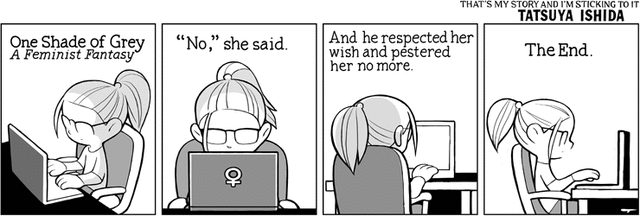 (I think my kind of movie would be based more on the cartoon above!) (I think my kind of movie would be based more on the cartoon above!) Kudos to those growing groups who are taking back the innocence, intelligence and dignity of men and women in movements seeking to overturn sexual violence and domestic (read criminal) abuse in relationships. Check out these empowering PSA campaigns like "It's On Us" and "NO MORE". So now, when the popularity of the book and movie “Fifty Shades of Grey” comes along, it would seem to be a backward step. What is it one buys into when buying tickets to see the movie or read the book? More than a controlled fantasy that one can turn on and off, one buys into the whole facade of a carnivorous male gender and a vulnerable female gender. It's a fantasy - a sensational lie some would say. It is not sustainable, and even damaging. From the article, The truth about the Fifty Shades of Grey Movie :"The reality is that if you take away the glamour, “Fifty Shades” is just a sensationalized lie, telling women that they can, and should, fix violent and controlling men by being obedient and devoted, and that, somehow, this is romantic." What is needed here? A friend wrote: "Personally, I would rather see young men and women (and teenagers) be influenced by more simple, yet compassionate ideas... " What is needed here? How about an image of men and women that portrays relationships that are balanced, respectful, pure and passionate and empowered by our highest sense of what is good? This is not only sustainable, it is the very cement of civilization. The images perpetrated by porn, and glamorized porn, degrade men as well as women, weaken our institutions and add to mental stress and illness. These ideas from Science and Health with Key to the Scriptures by reformer and author Mary Baker Eddy, reveal the basis for all strong, healthy and thriving relationships: Union of the masculine and feminine qualities constitutes completeness. The masculine mind reaches a higher tone through certain elements of the feminine, while the feminine mind gains courage and strength through masculine qualities. These different elements conjoin naturally with each other, and their true harmony is in spiritual oneness. Both sexes should be loving, pure, tender, and strong. ( from p. 57) Kindred tastes, motives, and aspirations are necessary to the formation of a happy and permanent companionship. The beautiful in character is also the good, welding indissolubly the links of affection. (from p. 60) Unselfish ambition, noble life-motives, and purity, — these constituents of thought, mingling, constitute individually and collectively true happiness, strength, and permanence. There is moral freedom in Soul ( a synonym for God, Truth and Love).( from p. 58) Here, moral is defined as a transitional quality – transitioning to spiritual understanding and wisdom. Moral. Humanity, honesty, affection, compassion, hope, faith, meekness, temperance. (from p. 115) The wealth of well-being and satisfaction we get from our relationships is born out of honesty and unselfishness. This is what emboldens us to stand up for what is good, and to perpetuate acts of tenderness, to stop the silence around violence and the violence itself, and let our lives return to peace and progress. Other posts on purity, power and courage:  a favorite hiking and prayer stop up in the northwoods a favorite hiking and prayer stop up in the northwoods One challenge after another hits. Not one, but two loved ones are diagnosed with a terminal illness. A surprise divorce. A friend dies. Another loved one in the hospital. A job ending. After experiencing all of the above, I had to stop what I was doing. Life was taking on a whole new seriousness. Because in the same time frame in our very large extended family, we had two babies being born, four new homes established, two new jobs started; there were stubborn character traits softened and the redeeming of a father-son relationship. There was something ground- breakingly persistent here. Life, like a northwoods lake twice a year, was turning over. For those of you who don't know, lake turnover is the seasonal movement of water in a lake, a process of the dense lower layer of a lake rising to become the upper, less-dense layer. Life is constantly moving, turning over, and over, in cycles. When the fear of death threatens to isolate or abandon us and tries to draw the very energy out of us, there is another lesson to be learned from the lake: that life is contained, transforming. We aren't alone or abandoned. Life doesn't work in linear finite ways. We can embrace the full cycles of Life. It is allright to cry, and let the fear gather in the eyes and be washed away. We are more than the physical body that starts out small, grows and then fails us. Who we are and who we love is about Spirit and our individualized expressions of Life. In our most challenging times, we let the natural light of Spirit transform us and let our dense lower sense of ourselves and loved ones be lifted, pushed away by a lightness and warmth of our spiritual being. The fruits of these challenges is that it forces us to experience each other in a new way – more spiritual. The passion, adventure, delight and drama of one, the energy, loyalty and love of another rises to the surface and we forgive the rest. Any regret, resentment, anger can be transformed like dead leaves into a rich and fertile place from which to grow stronger. This is Life, continuing to create. There is constant renewal, as spring to summer to fall to winter and then over again. Though heart-rending challenges, we too are turning over, seeing ourselves and others in a new light. Life is consistent, insistent and persistent. We can never lose one another when we acknowledge who we are spiritually, in these cycles of light and life. 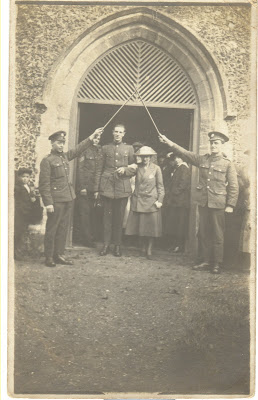 My grandparents on their wedding day. (c) My grandparents on their wedding day. (c) We have a family story that I like to share around this time of the year. My mom’s father, Walter (or Butchie as he was known to us), was with the Scottish regiment on December 24, 1914, and was a part of that most wonderful Christmas Eve truce. My mom remembers him talking about it and sharing the news of playing football with others. Butchie survived this war, married and had five children. He also introduced three generations to Christian Science after having been healed through Christian Science of severe head injuries. (But that's another story for another time!) While browsing the internet about the famous truce, I found a letter that a soldier wrote during that time. It's become famous as you will read. (I've copied it as it appeared on interfaithforums.com.) It is an amazing story, remarkable situation. It is a tribute to all soldiers everywhere and a reminder that "on each end of the rifle, we're the same." The Christmas Truce Letter On November 7, 2006, singer Chris de Burgh paid £14,400 at Bonhams auction house for an original 10 page letter from an unknown British soldier that records events and incidents with the Germans on that night (during World War I) describing "the most memorable Christmas I've ever spent". The letter begins: This will be the most memorable Christmas I've ever spent or likely to spend: since about tea time yesterday I don't think theres been a shot fired on either side up to now. Last night turned a very clear frost moonlight night, so soon after dusk we had some decent fires going and had a few carols and songs.The Germans commenced by placing lights all along the edge of their trenches and coming over to us — wishing us a Happy Christmas etc. They also gave us a few songs etc. so we had quite a social party. Several of them can speak English very well so we had a few conversations. Some of our chaps went to over to their lines. I think theyve all come back bar one from 'E' Co. They no doubt kept him as a souvenir. In spite of our fires etc. it was terribly cold and a job to sleep between look out duties, which are two hours in every six. First thing this morning it was very foggy. So we stood to arms a little longer than usual. A few of us that were lucky could go to Holy Communion early this morning. It was celebrated in a ruined farm about 500 yds behind us. I unfortunately couldn't go. There must be something in the spirit of Christmas as to day we are all on top of our trenches running about. Whereas other days we have to keep our heads well down. We had breakfast about 8.0 which went down alright especially some cocoa we made. We also had some of the post this morning. I had a parcel from B. G's Lace Dept containing a sweater, smokes, under clothes etc. We also had a card from the Queen, which I am sending back to you to look after please. After breakfast we had a game of football at the back of our trenches! We've had a few Germans over to see us this morning. They also sent a party over to bury a sniper we shot in the week. He was about a 100 yds from our trench. A few of our fellows went out and helped to bury him.About 10.30 we had a short church parade the morning service etc. held in the trench. How we did sing. 'O come all ye faithful. And While shepherds watched their flocks by night' were the hymns we had. At present we are cooking our Christmas Dinner! so will finish this letter later.Dinner is over! and well we enjoyed it. Our dinner party started off with fried bacon and dip-bread: followed by hot Xmas Pudding. I had a mascot in my piece. Next item on the menu was muscatels and almonds, oranges, bananas, chocolate etc followed by cocoa and smokes. You can guess we thought of the dinners at home. Just before dinner I had the pleasure of shaking hands with several Germans: a party of them came 1/2 way over to us so several of us went out to them. I exchanged one of my balaclavas for a hat. I've also got a button off one of their tunics. We also exchanged smokes etc. and had a decent chat. They say they won't fire tomorrow if we don't so I suppose we shall get a bit of a holiday — perhaps. After exchanging autographs and them wishing us a Happy New Year we departed and came back and had our dinner.We can hardly believe that we've been firing at them for the last week or two — it all seems so strange. At present its freezing hard and everything is covered with ice… The letter ends:There are plenty of huge shell holes in front of our trenches, also pieces of shrapnel to be found. I never expected to shake hands with Germans between the firing lines on Christmas Day and I don't suppose you thought of us doing so. So after a fashion we've enjoyed? our Christmas. Hoping you spend a happy time also George Boy as well. How we thought of England during the day. Kind regards to all the neighbours. With much love from Boy. For more information and background, see and read more about a movie, Joyeux Noël, made about this event. Note: The photo is a family photo and is not for circulation. (c)  “I felt like I was coming home,” Barbara says. “I felt like everything would be okay.” This comment is from an article written by a woman who commented on her first thought when starting to read Science and Health with Key to the Scriptures by Mary Baker Eddy in an effort to re-gain her peace and equilibrium after a rape incident. (See article here.) Her triumph reminded me of an incredible friendship I had with a friend who was going through therapy due to incest. During our friendship, I learned more about the power and fixity of purity that has stayed with me ever since. When I first heard of the situations my friend had endured, I was shocked and furious. She was getting help through the therapy and was a determined young woman. I so wanted to help her. I remember researching what I could do legally to help her. I got acquainted with many of the local resources dealing with women, sexuality and abuse. I worked in the school system at the time and even produced a cable television program on this issue that included interviews with area social service agencies, call-ins and production staff. The issue exhausted me, angered me, while at the same time I wanted to be strong for my friend. I knew that all of these human footsteps were important and helpful. But what I needed, and my friend needed, was something much more deeply spiritual. We must have talked and walked around a nearby lakes dozens of times. I prayed throughout our friendship and on one of our walks, I started sharing some of the spiritual ideas that I was learning: 1. Our very being is spiritual - it is the spiritual elements in life that move us, give us our identity, cause us to grow. 2. Our very being is pure - undefiled, untouched. This is a fixed fact and is unalterable. 3. Nobody can touch our spiritual being - our spiritual identity. Just as no one can change the idea of the numeral nine, no one can change the idea or spiritual being that is you and me. 4. Our identity is not that of a victim, of a vulnerable person who lacks strength, intelligence, courage. These suggestions are shadows that fluctuate and flee in light of the purity that is ours. 5. Violence, perversion, coercion -- these are not our fault. It is not brought about by some perceived lack in ourselves. It is born of ignorance and dies of ignorance. It has no power, presence, influence or reason unless we give it to them. 6. The most loving thing we can do for one another is to not believe in the shadows, but affirm one another's light -- one's primitive purity. I also relied heavily on some tried and proven foundation stones for my life.
My friend and I exchanged many spiritual ideas for months. She remained strong and significant and healthy changes were made in her life. Key to the healing was forgiveness - the ability to see the power of Love and the powerlessness of errant actions to take anything of substance away from what God has given us. Later, we both went on to graduate school and lost touch. But what remained is that unshakeable truth that I can now come home to - Our purity is a fixed fact. *article first appeared in http://kimckorinek.blogspot.com/2010_09_01_archive.html 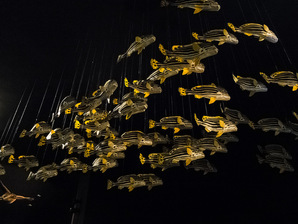 Like fish in the ocean looking for the water, sometimes evil would blind us to the good already around us. Like fish in the ocean looking for the water, sometimes evil would blind us to the good already around us. Evil is not power. That's a pretty big idea to take in. The world's stage plays out the drama of good and evil daily, so how can we make this claim? It's been made before. Mary Baker Eddy, discoverer and founder of Christian Science, wrote "Mankind must learn that evil is not power. Its so-called despotism is but a phase of nothingness. " (from Science and Health p. 102) But have I ever experienced this phase of nothingness? I think we all have in some degree. One time, I had a disagreement with a neighbor, but I refused to give in to anger and self-justification. Instead I deliberately decided to love this individual and to do something kind. The result? We became good neighbors for years, until we moved! A small thing perhaps, but looking at it more closely, I saw that evil - showing up as anger - could only be acted upon if I agreed to it. And if I agreed to it, it would only become more self-destructive. No resolution toward peace would have been made. But as I agreed to something good, my actions took on a meaningful and multiplying influence that lasted. So what happened here? What principle of peace was operating? Is it that goodness is the only power and that evil is a supposed vacuum needing to be plugged in to a power source in order to have influence? Evil is not a power source as it has only the power it is given. So when we are deliberate about not giving it power, not entertaining it, not fearing it, we feel the Love that is already there. To divest thought of false trusts and material evidences in order that the spiritual facts of being may appear, — this is the great attainment by means of which we shall sweep away the false and give place to the true. Evil would blind us to the good already operating. Taking on the identity of a person or place or a thing, it may appear frightening and insurmountable. But we can choose to detach evil of any identity. Evil, unplugged, no longer has influence. Once the fear is gone, only what is real, substantial, harmonious -- all that is sustainable -- fills consciousness. We then feel the divine energy of Spirit, the calm strong currents of true spirituality and are at peace. The calm, strong currents of true spirituality, the manifestations of which are health, purity, and self-immolation, must deepen human experience, until the beliefs of material existence are seen to be a bald imposition, and sin, disease, and death give everlasting place to the scientific demonstration For victory over a single sin, we give thanks and magnify the Lord of Hosts. What shall we say of the mighty conquest over all sin? A louder song, sweeter than has ever before reached high heaven, now rises clearer and nearer to the great heart of Christ; for the accuser is not there, and Love sends forth her primal and everlasting strain. 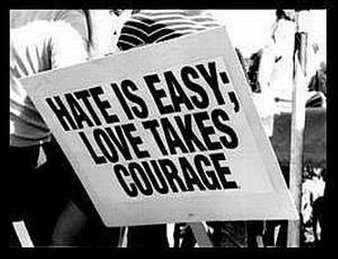 For victory over a single sin -- any inferior idea that would take us away from Life, Truth and Love? What a hopeful victory this is! And when we see even one such victory, it maps out the path for more. And when we see a victory over prejudice, well then, we are just opening the door to greater possibilities of freedom, cooperation and compassion. Prejudice always is about limitation and ignorance. Based on fear, it never lends itself to the higher order of intelligence, but generalizes into simplistic categories to a point where it becomes downright wrong. The relationship between prejudice and categorical thinking was first addressed by Gordon Allport (1954) in his classic book The Nature of Prejudice. Allport wrote that: “The human mind must think with the aid of categories....Once formed, categories are the basis for normal prejudgment. We cannot possibly avoid this process. Orderly living depends upon it. (p. 20)” But this is where all limitation and regression rush in. As it says in Science and Health (p. 144) "Ignorance, pride, or prejudice closes the door to whatever is not stereotyped." It follows then, if we are to progress individually and as a group or a nation, we need to challenge these categorical prejudices and replace them with a more universal and spiritual understanding of who we are in the world. This takes courage, and this takes love. Fortunately, we are made of both. There continues to be hopeful and progressive news on the human rights scene. As much as these have been forward steps for human rights, these steps are also victories over sin - over ignorance and prejudice. What is even more hopeful is that it demonstrates a thinking public willing to go deeper than stereotypes.
In each of these cases, there was controversy, but there was an insistence to go further than categorizing an issue as imminently evil and therefore only needing to be controlled, tolerated or forced to change. In each of these cases, there was a deliberate commitment to blast out of stereotypes that had been accepted for so long and re-think the issue from a higher standpoint. Jesus' instruction to love one another helps us break through the categorical stereotypes so easily attached to others. Prostitution is seen as reversible, instead of inevitable. Homosexuality is no longer equated with sensuality. Resentment is seen as temporary and fleeting, capable of being healed. Each higher idea makes way for new solutions, and lets stand a higher understanding of the very nature of man as spiritual, pure and innocent. In the New Testament, it reads, “There is neither Jew nor Greek, there is neither bond nor free, there is neither male nor female: for ye are all one in Christ Jesus.” (Galatians 3:28) There is no prejudice in oneness. There is no accuser standing outside of us, pointing the finger. There is no “outside." We are all one in Christ. This is radical. It is also true. Our unity with God and man gives us the expansive platform in which we can find peace and progress – infinite and immediate potential for good in all ways. Now that's worth a louder song!! 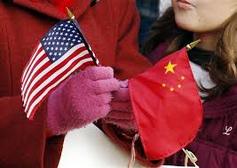 Reading the news about the breakthrough in the carbon emission deal between China and the US made for headlines all over the world. So what pushes progress of this nature and what can sustain it? Has thought reached critical mass to see that we need to drop the lesser posturing of politics and work together for life saving measures? Have we reached a time where act together with an unselfish and pointed realization of our responsibility to safeguard the future? “Life demonstrates life.” This simple statement from Mary Baker Eddy assures us that all that is life-affirming and life-giving is the force behind progress. “Good is not helpless....” is another simple statement that points to the power of good – of all that is helpful, sound, appropriate, and honest. Goodness, as a quality of God, is not passive. It will not be hid or passed by. Goodness demands expression, just as life demands life. The US and China have promised to take steps that can profoundly advance the health of our planet. Can this endure? Can this act lead to fuller cooperation? Our witnessing to God's law of harmony and trust in God's law of progress help to clear the path to greater works  There are so many of us joining in prayer. Whether it is a prayer of petition, a prayer of affirmation or a prayer of celebration for the good done and to be done, all these earnest and expectant voices are not given in vain. In fact, some may say that this is what turns the world – a constant, attentive connection to God, Love and the insistent and persistent expectation for a better world.
In addition, one of my favorite sources for news is The Christian Science Monitor – daily international reporting written for thinkers serious about understanding the mechanics of peace, progress, health and opportunity for all. Please feel free to share your prayer and news resources! 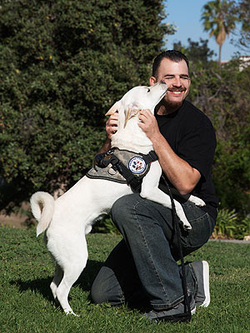 Story about Pets for Vets from People Magazine http://bit.ly/1tDUD4D Story about Pets for Vets from People Magazine http://bit.ly/1tDUD4D This just needs to be spread around! Pets for Vets is an amazing program that puts together partnerships of dogs with soldiers struggling with PSTD. Story after story show how healing happens in these partnerships. It is brilliant. Its spiritual basis points to Love, God, to help heal, comfort and redeem. If one is struggling with recurring nightmares and re-living traumatic experiences, a dog's sense of the nowness of life helps restore focus on the present. It hints at the omnipresence of Love. If one is trying to avoid or escape from these experiences, a dog's loyalty can move thought to experience life now. 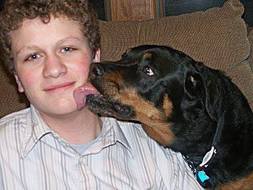 If overwhelming guilt or self-condemnation argue that one doesn't deserve happiness, a dog makes demands that you feed, walk and care for them. It is instantly gratifying to know you are needed and can take of another. Giving care helps to open thought to receiving care. A dog's loyalty and love lets you know you deserve care. Regardless of how traumatic a situation was, a dog who may have even experienced trauma can help show the recuperative power of forgiveness for oneself and others. Forgiveness helps to bring closure and peace and frees up the ability to live – to create and to love again. 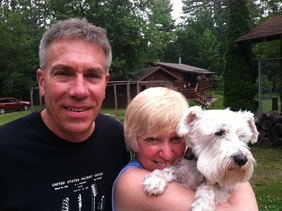 When everything is changing, slight changes can set off a flood of emotion. The constancy of love, the unconditional outpouring of Love are at the root of the comfort and assurance expressed by these animals, reflecting God's omnipotent love. I grew up with dogs and made sure my kids had dogs when they grew up. The love, loyalty and playfulness and companionship of these devoted animals point to the timeless spiritual Truths that Love heals. Love understands. Love never leaves you. God never sends or creates trauma, but gives us the strength and dominion to overcome these problems. The loyalty, devotion, innocence, forgiveness and playfulness of these beautiful animals reflect the power of God's love and help show us the way.
“We'll be Friends Forever, won't we, Pooh?' asked Piglet.  We are all children of God. I think people of most faiths would agree. But then came Oliver Bear. With a name straight out of some yet-to-be-written classic children's book, and the latest addition to our clan, his birth has me thinking about the childlikeness in each of us, and how this childlikeness never ends. It is as immortal and forever - even longer!- as love itself. Childlikeness is Godlikeness --- you can see it in the calm and untamed eyes of the newborn and in the parent's eyes --deep set with satisfaction and quiet joy. But does this purity and peace ever die off? Never! There is a story I recently heard about a new older sister who demanded to spend time alone with the newborn. She was so adamant about being alone with the baby, the mother wasn't quite sure how to go about it. She finally relented and kept the baby monitor on high, so she could hear what was going on in the room during their visite. Once alone with the baby in the nursery, the sister went to the newborn, and in a low whisper, said, "Tell me what God looks like. I am forgetting." Heart tugging as that story is - and if any of you can reference this story, please do - we can never lose or forget our connection to God, that pure and ever-fresh connection to divine Love itself. Purity, adventure, wonder, exploration are just some of those childlike qualities derived from our God, who is Love. We are created as representatives of Love, so that we are each others' reminders that Love is here, adventure is here, wonder is here. Regardless of our age ( or how many times we have circled the sun) we can never lose our childlikeness, because it is God's likeness. All we need to be reminded of this is to look into one another's eyes. "All this he saw, for one moment breathless and intense, vivid on the morning sky; and still, as he looked, he lived; and still, as he lived, he wondered." One of my favorite sites posted an article "The disease of being busy". So poignant it made me wince, and got me thinking...... Contemplation and rest are a regular part of a balanced day and so for every effective and meaningful expression, there needs to be equal time for reflection. Like the moving wheel on a bicycle, rollerskate, wagon, etc., if you look at one part it looks like it is moving forward, but if you look at the lower part it looks like it is moving backward. And yet, if it weren't for both parts, it wouldn't move at all! Looking at the whole experience of the moving wheel, there is continuity and progress, made up of many moments of up, down, back and forth. A wheel whose parts only go up is no wheel at all. Neither is a life whose busyness is always up, up up. Our lives need those moments of up, down, back and forth to continue to move us forward. For every effective and meaningful expression, there is equal time for reflection. It takes a conscious effort, but I need to constantly remind myself and give myself permission to be still. And most importantly, to remove the fear that if I am still, I will miss out on important moments. It's a big fear, this fear of missing something. It blares at us constantly. The best way to counter it? Radical satisfaction. To be still and to realize the wonder of today. Does that sound schmaltzy? Too bad. In the mad marketing world of convincing us that we need something faster, fuller, or freer, we can stand up to this and recognize all that we have, Deeper still, to recognize the grace and the gift of our lives now is truly radical. Radical as in rootedness. We counter the hurry of pursuit to feel satisfied, grounded, and in our right place. Taking the time to feel rooted, grateful, and still feeds the soul and strengthens us for the times we are productive and going full steam. The gentleness of yielding to a balanced and grateful life is seen in so many ways, including this joyful group surge of gratitude like RAK Friday. (You'll just have to click here to love this!) Here is a poem I've shared often, and I'll share it again. I hope you take a moment and drink it in. Be still and know that I am God. So God created humankind in his image,  Have you ever had concerns about your body image? Or how about keeping up a professional image? And what about concerns like what other people think about you - in other words, what image of you they hold in thought? The first account of Genesis states that we are made in the image and likeness of God. That would seem to trump any other image we could come up for ourselves! We may be ready to accept the idea that God is the first and foremost Creator. But how much of our Creator do we really know? And if we are indeed created in His/Her image and likeness, then how much do we truly know about our true image. The first chapter in Genesis tells us that we were created in the image of God and that male and female were created at the same time. God's work was complete and God concluded Her creation declaring it all very good. God's work was completed. and God does not undo or redo Her work. Think of ourselves now, being made in the image and likeness. We are whole. Male and female are equal. We are not only good, but we are very good. God was pleased with Her creation. There is no undoing or redoing of who we are. What a contrast to the image-making that can take up so much of our efforts. Diets, make-up, self-help courses, even branding ourselves or trying on different personages via social media. Any effort that starts from a basis of lack and then tries to fill that hole with our self-created attempts can be exhausting! But to see ourselves as the image and likeness of God, of Love itself. To know ourselves as starting from the basis of being complete and whole. Satisfied. From that basis, we are free to be creative, to be less fearful and less self-oriented. In the days of kings and queens and as is recorded in Old Testament times, royalty used to have their images on coins and as statues placed around the kingdom as reminders to the people of who ruled them. Taking this idea to the first chapter of Genesis, we see that God has created us in His image and likeness. We are the likeness, the representatives of God. We are reminders to one another that God is with us. We are the evidence of God. Like the story of the little boy who was asked "How do you know that God is here?" His response: "I know God is here, because I am here." Our world view shifts as we shift the very understanding of who we are - as it goes from a material and personal basis, to a spiritual and immortal basis. A whole new world of possibilities open up before us, which before were buried as we were preoccupied trying to maintain an unsustainable view of oneself. Now we see things imperfectly, like puzzling reflections in a mirror, but then we will see everything with perfect clarity. All that I know now is partial and incomplete, but then I will know everything completely, just as God now knows me completely. 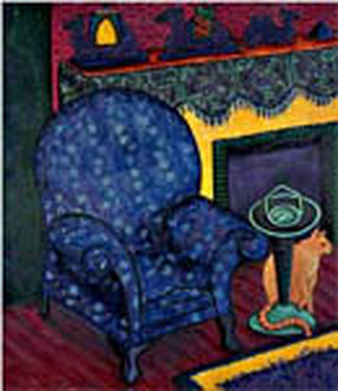 I have a sweet reminder of God's tenderness and ever-present comfort that I would like to share with you. When my youngest son was an infant and still nursing, my oldest son was just three. When it came time for a feeding, Micah and I would sit in an oversized chair as I held Gabe. Micah would sit quietly and hold his brother's feet while he nursed. Sometimes we would talk. Sometimes we would be quiet. The chair got to be known as the Family Chair. The quietness and nourishment being given at that time stays with me. I see in it the same spiritual qualities that are available to each of us when we pray. When we pray, we sit in a mental space with room in thought for everyone we love. We are in the arms of Love. We are safe. We listen and learn of God's peace, grace and permanence. We learn that God is All. We trustingly receive that nourishment from God which, in turn, strengthens us and causes us to grow. Sometimes we talk to God. Sometimes we are quiet and listen. We are settled and in our right place. God is guiding our feet. "Take from us now the strain and stress, and let our ordered lives confess the beauty of Thy peace." - John Greenleaf Whittier |
Kim C Korinek, CSBPhone: Translate here!
Archives
June 2018
banner photo (c) Micah Korinek; other photos by Gabe Korinek, Kim Korinek, Brad Crooks. Leslie Larsen (c) 2016
|
Services |
|







 RSS Feed
RSS Feed